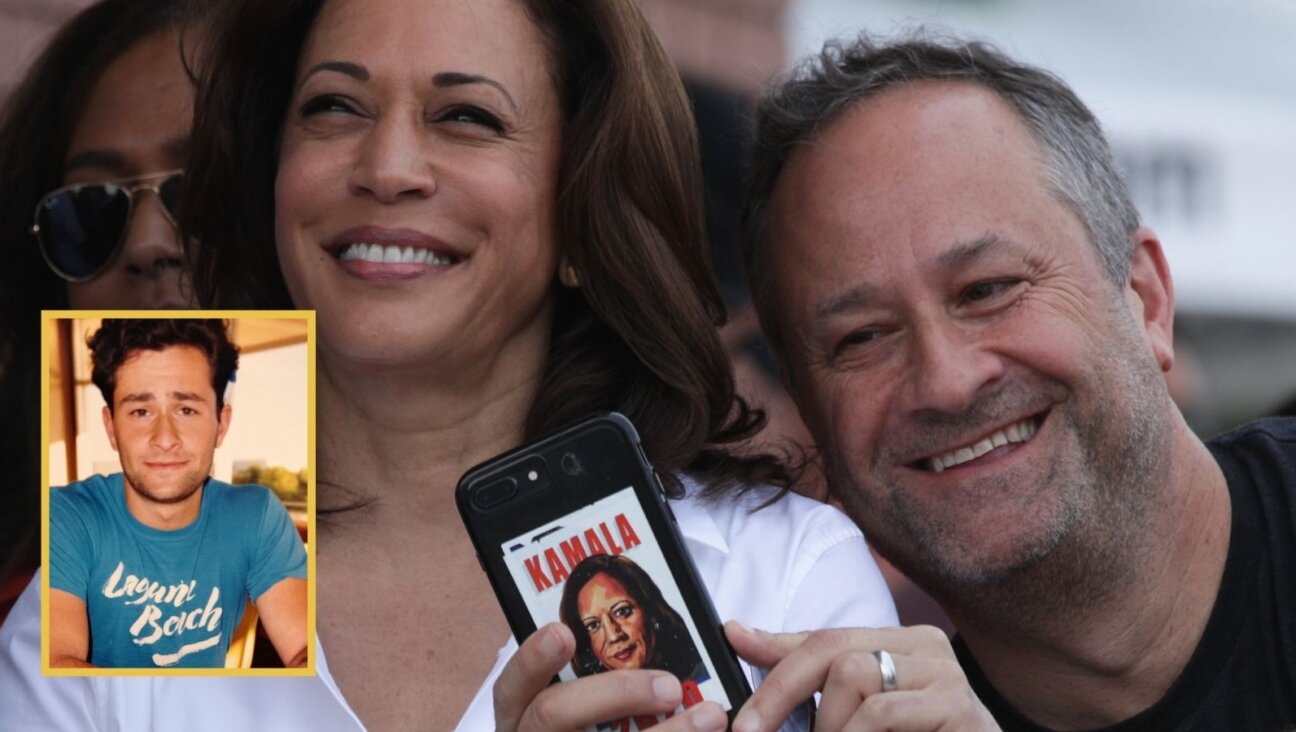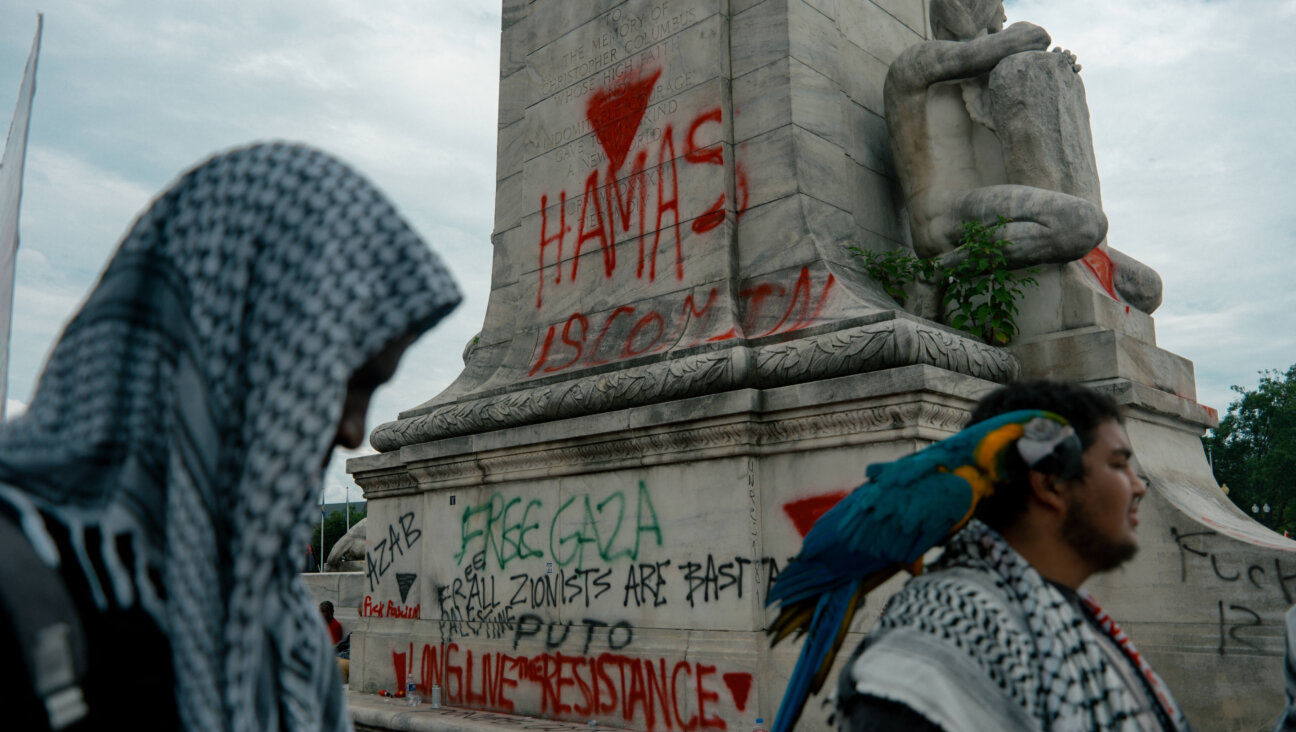Bush Works At Avoiding Public Spat With Sharon
WASHINGTON — The Bush administration appeared to inject itself into Israel’s hottest internal dispute this week, quietly relaxing its opposition to construction in West Bank settlements just as Israel’s own Interior and Justice ministries are battling to freeze construction and prepare for the settlements’ dismantling.
Administration officials are publicly denying reports, first published in The New York Times on August 21, that Washington was softening its opposition to new construction in the settlements. However, several Israeli officials and former U.S. officials confirmed to the Forward that the administration indeed was refraining from criticizing new settlement projects announced in Israel in recent days and was seeking to resolve differences in quiet talks.
Administration officials reportedly said the muting of criticism was meant to help Prime Minister Sharon pursue his disengagement plan, which has run into stiff opposition from the right. But numerous observers, including some close to the administration, say the move is largely a political one, aimed at courting conservative Jewish and Christian voters.
The administration’s silence comes as Israel’s own interior minister and attorney general are moving to rein in settlements by cutting their funding and redefining their legal status. The attorney general’s move in particular is aimed at limit- ing the damage to Israel from last month’s ruling by the International Court of Justice in the Hague against Israel’s West Bank security fence.
The world court called the settlements illegal under international law and has fueled concerns in Jerusalem regarding the possibility of international sanctions. Last week, in a statement to the press, Israeli Attorney General Menahem Mazuz warned: “It is hard to exaggerate the negative consequences of the International Court of Justice decision.” The decision, Mazuz cautioned, “creates a different legal reality for Israel in the international sphere, which could serve as an excuse and catalyst for various activities against Israel in international and national forums, including the possibility of sanctions.”
The 115-member Non-Aligned Movement, meeting last week in South Africa, resolved “to prevent any products of illegal Israeli settlements” from entering their markets, and called on the United Nations Security Council to impose sanctions on companies involved in building Israel’s West Bank security fence.
Israel is also coming under intense criticism from the U.N.
In sharp contrast to the American silence on Israel’s recently announced plans for 1,500 new housing units in the territories, Jerusalem was rebuked Tuesday by the office of United Nations Secretary-General Kofi Annan. “The secretary-general calls on the government of Israel to cease this settlement expansion and to fulfill its ‘road map’ obligations,” U.N. spokesman Stephane Dujarric told reporters, referring to the U.S.-led plan for Israeli-Palestinian peace.
In addition to Annan’s criticisms, John Dugard, the U.N.’s special rapporteur on human rights in the Palestinian territories, reportedly slammed Israel in a new report. In his report, submitted to the U.N. General Assembly, Dugard likened Israel’s presence in the West Bank and Gaza to “an apartheid regime” that is “worse than the one that existed in South Africa.”
To counter the rising tide of international condemnation and head off sanctions, Mazuz is reportedly recommending that the Israeli government “thoroughly examine” the possibility of formally applying the Fourth Geneva Convention — an international treaty that governs the treatment of civilians in occupied territory — to the territories.
Such a step would overturn the policy of all Israeli governments since 1967. Israel’s position has been that no recognized sovereign existed in the territories before 1967, so they are not “occupied” as defined in the convention.
Israel has agreed to apply the convention’s humanitarian provisions, but always has stressed that this does not constitute formal acceptance of the convention’s applicability in the territories. In particular, Israel rejects the claim that the settlements violate the convention, which forbids the transfer of civilians into occupied territory.
The Palestinians and their international supporters oppose Israel’s position, and have sponsored numerous U.N. resolutions stating that the treaty does apply to the territories and is binding on Israel.
The International Court of Justice’s July 9 ruling on Israel’s West Bank security fence stated that the barrier cannot be built in “occupied Palestinian territory” — meaning anywhere beyond the 1967 border — and that Israel must dismantle existing sections and compensate the Palestinians. The court also ruled that the occupation and settlements violate international law.
The U.N. General Assembly adopted the court’s opinion July 20 and is expected to discuss the issue again in September, when the Palestinians are likely to request sanctions against Israel. Should the Americans, as expected, veto this idea in the Security Council, the Palestinians will ask the General Assembly to recommend that member states impose sanctions.
A Justice Ministry team examining the issue has stated that Israeli officials should refrain from attacking the international court. The team recommended building the fence as close as possible to the 1967 border, taking into account security needs and the need to minimize harm to Palestinians. Where settlements abut the Green Line, it said, the fence should lie as close as possible to the outermost houses of these settlements. The Justice Ministry legal team declined to make recommendations about the fence’s route in Jerusalem.
In a separate development, Israel’s Interior Minister, Avraham Poraz, is threatening to withhold $16.5 million from the settlements unless Likud Finance Minister Benjamin Netanyahu budgets more money for municipalities inside Israel’s 1967 borders.
Both the Interior and Justice ministries are controlled by the secularist, anti-clerical Shinui Party.
Meanwhile, the Bush administration is slowly conducting negotiations with the Israeli government to achieve an agreement defining the type of settlement construction that the White House finds acceptable. Both Israeli and American sources say that neither government appeared eager to reach an agreement on the pace of construction any time soon.
A team of American experts, headed by Connie Meyer, a senior analyst in the State Department’s Bureau of Intelligence and Research, is scheduled to arrive in Israel early next month. Meyer is an experienced diplomat who formerly served at the American consulate in Jerusalem, but she does not enjoy the seniority of previous American envoys who negotiated settlement issues with the Israelis.
“We are currently involved in technical talks with the government of Israel in an effort to clarify their intentions with respect to the settlements,” said State Department spokesman Adam Ereli during a briefing Monday. “And we will continue to work with the government of Israel toward a settlement freeze as is called for in the road map.”
Ereli denied a report in The New York Times claiming that the Bush administration has changed its policy regarding the construction of new homes in West Bank settlements. But he failed to criticize directly the new housing initiative.
The White House, current Israeli officials and former American officials say, seems prepared to accept continued Israeli building within the boundaries of existing settlements. In essence, pro-Israel activists in Washington said, it is a de-facto acceptance of Israel’s interpretation of a “freeze” on settlement activity: building within the areas zoned for construction in existing settlements, while not building new settlements or geographically expanding existing ones. “That has been our position for years, and we are now fine-tuning it with the administration,” a senior Israeli official said.
Israeli officials contend that for several years the White House has, in practice, already accepted Israel’s interpretation. Still, if the Bush administration were to endorse formally the Israeli position, it would mark a dramatic shift from official long-term American policy. Previous administrations have opposed any settlement activity in the West Bank, considering it an obstacle to peace.
A message from our editor-in-chief Jodi Rudoren

We're building on 127 years of independent journalism to help you develop deeper connections to what it means to be Jewish today.
With so much at stake for the Jewish people right now — war, rising antisemitism, a high-stakes U.S. presidential election — American Jews depend on the Forward's perspective, integrity and courage.
— Jodi Rudoren, Editor-in-Chief






















